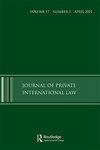The overview of private international law in Nigeria
IF 0.5
Q3 LAW
引用次数: 0
Abstract
As an emerging economy, Nigeria attracts foreign direct investment and foreign portfolio investment as well as commercial parties and sovereign States engaged in private transactions thereby increasing the possibility of cross-border disputes, which would often require the use of private international law (“PIL”) principles to resolve them. PIL concerns relationships involving foreign elements that transcend national boundaries. It determines issues of jurisdiction, choice of law and the recognition and enforcement of decisions as well as issues that may arise when foreign private laws interact with the laws of the forum in which legal action is brought in matters of civil and commercial law or family law. In Nigeria, the significance of PIL is seen not only in international transactions involving foreign elements but also within inter-State transactions and disputes as Nigeria is a federation consisting of 36 States and the Federal Capital Territory Abuja, with a separate jurisdiction and laws for each State’s courts as established in the Constitution of the Federal Republic of Nigeria 1999. Indeed, as Nigeria is a federation, the same general PIL approach used in international matters should equally apply to intra-State matters. However, some Nigerian lawyers, academics and judges often seem to struggle with the concept of PIL: for example, in some cases, Nigerian judges have applied PIL principles to resolve Nigerian disputes that do not contain any foreign elements or involve intra-State matters. Due to Nigeria’s relationship to the United Kingdom and its membership of the Commonwealth, the common law foundations of Nigerian PIL, and some尼日利亚国际私法概览
作为一个新兴经济体,尼日利亚吸引了外国直接投资和外国证券投资,以及从事私人交易的商业方和主权国家,从而增加了跨境争端的可能性,而跨境争端往往需要利用国际私法原则来解决。PIL涉及涉及超越国界的外国因素的关系。它确定了管辖权、法律选择、决定的承认和执行等问题,以及外国私法与就民商事法或家庭法事项提起法律诉讼的法院地法律相互作用时可能出现的问题。在尼日利亚,PIL的重要性不仅体现在涉及外国分子的国际交易中,也体现在国家间交易和争端中,因为尼日利亚是一个由36个州和联邦首都阿布贾组成的联邦,根据1999年《尼日利亚联邦共和国宪法》的规定,每个州的法院都有单独的管辖权和法律。事实上,由于尼日利亚是一个联邦,在国际事务中使用的一般PIL方法应同样适用于国家内部事务。然而,一些尼日利亚律师、学者和法官似乎经常对PIL的概念感到困惑:例如,在某些情况下,尼日利亚法官应用PIL原则来解决尼日利亚不包含任何外国因素或涉及国内事务的争端。由于尼日利亚与英国的关系及其英联邦成员国身份,尼日利亚PIL的普通法基础以及
本文章由计算机程序翻译,如有差异,请以英文原文为准。
求助全文
约1分钟内获得全文
求助全文

 求助内容:
求助内容: 应助结果提醒方式:
应助结果提醒方式:


